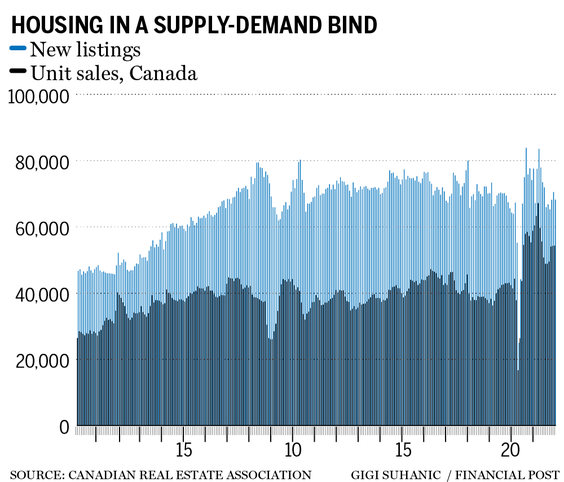RBC forecasts ‘super strong’ sales in first half of year
Author of the article: Pamela Heaven
Publishing date: Jan 31, 2022

Article content

Good Morning!
2021 by all accounts was a record-breaking year for Canadian real estate — a blockbuster for sales, prices and low inventories.
Such a pace is unsustainable, most agree, but how much of a comedown are we in for?
“Canada’s housing market isn’t about to buckle,” writes RBC senior economist Robert Hogue in a recent report.
The market will cool from the torrid heights of ’21, says Hogue — a view shared by most economists and industry experts, but a continuing shortage of supply and unmet demand are expected to drive “tremendous activity” this year.
RBC forecasts 579,600 existing homes will be sold this year. That’s down 13.1% from the record 667,000 transitions in 2021, but it’s still the second highest number in history, he said.
Most of the slowing will happen in the second half of the year, says RBC, with the outlook for prices in the first half to remain “super strong.”
Canada’s perennial problem of short supply is the biggest driver.
A report by Bank of Nova Scotia chief economist Jean-François Perrault says that Canada has the
lowest average housing supply per capita among the G7. Within Canada, the housing shortage is most severe in Ontario, Alberta and Manitoba.
RBC estimates that the Canadian market was short 180,000 to 250,000 listings at the end of 2021. To achieve a better balance between supply and strong demand, active listings would need to triple, wrote Hogue.

In the meantime, sellers maintain a tight grip on just about every market in Canada, with many smaller centres seeing bidding wars for the first time.
Inventories were at record lows for most provincial markets at the end of 2021 and RBC expects competition between buyers to remain “fierce” even beyond Toronto and Vancouver.
Demographics should keep demand strong, says Hogue. Millennials, now in their mid-20s to early 40s, are swelling the ranks of Canadians in their prime years for buying a home. RBC says there were 10.5 million people aged 25 to 44 in Canada in 2021, an increase of 8.3% in the past five years. “If historical ownership patterns hold, millennials will remain a major force in the housing market in 2022 and beyond,” wrote Hogue.
Immigration is also set to increase with the government target rising to 411,000 this year.
Immigration typically hits the rental market first, but RBC also believes some skilled workers coming to fill labour gaps will be ready to buy as soon as they arrive.
The big event that will tap the brakes on the housing market is Bank of Canada rate hikes. RBC expects six hikes totalling 150 basis points over about 18 months, causing both variable and fixed mortgage rates to rise “materially” — even to the point of pushing up the mortgage qualifying rate.
This alone should dampen demand, especially in expensive markets like Toronto and Vancouver.
At the same time more supply is expected to come on the market, said RBC. Housing starts climbed last year to levels not seen since the mid-1970s. All going well, that could boost completions to almost 250,000 units in 2022, up from the average of 190,000 units over the past five years.
That increase along with slightly slower demand should “noticeably” ease the imbalance, said Hogue.
Yet, RBC doesn’t think the housing market will see abrupt changes. “These will be the first steps on a long road to normalization. We do expect 2022 will be a remarkable year by almost any standard … unless you compare it to 2021,” wrote Hogue.
The global outlook for real estate returns also looks strong. Oxford Economics forecasts that total returns for direct real estate and REITs will average 6.5% to 7% a year over the next five years, significantly outperforming bonds and equities that it projects will return 0.7% and 2.5% a year, respectively.


